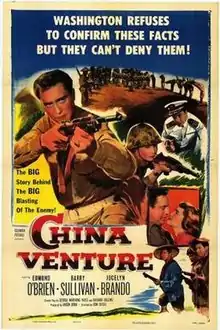| China Venture | |
|---|---|
 Theatrical poster | |
| Directed by | Don Siegel |
| Written by | George Worthing Yates Richard Collins |
| Story by | Anson Bond |
| Produced by | Anson Bond |
| Starring | Edmond O'Brien Barry Sullivan Jocelyn Brando |
| Cinematography | Sam Leavitt |
| Edited by | Jerome Thoms |
| Music by | Ross DiMaggio |
| Distributed by | Columbia Pictures |
Release date |
|
Running time | 83 minutes |
| Country | United States |
| Language | English |
China Venture is a 1953 American World War II adventure war film directed by Don Siegel. The plot concerns an American patrol sent into South China during World War II to rescue an important prisoner held by Chinese guerrillas.
Plot
In 1945, during World War II, a Japanese admiral is severely injured in an airplane crash in a remote jungle. He possesses vital intelligence that may affect the course of the war. A joint American team of Marines and Navy personnel are deployed to locate the admiral and interrogate him before he dies from his wounds. The mission is plagued by both the Japanese occupiers and Chinese guerilla forces. O’Brien and Sullivan clash initially, but grow to respect one another before Sullivan is murdered at the hands of Askin.
The Japanese prisoner is successfully delivered to a US submarine, and his interrogation reveals that the Japanese military is determined to fight to the bitter end. The picture closes with documentary footage of a mushroom cloud, suggesting the Americans resort to atomic warfare to defeat Japan.[1]
Cast
- Edmond O'Brien - Capt. Matt Reardon
- Barry Sullivan - Commander Bert Thompson
- Jocelyn Brando - Lt. Ellen Wilkins
- Leo Gordon - Sgt. Janowicz
- Leon Askin as Wu King
- Lee Strasberg - Patterson
- Richard Loo - Chang Sung
- Dayton Lummis as Dr. Masterson
- Dabbs Greer as Galuppo
- Philip Ahn as Adm. Amara
- James Anderson as Cpl. Walters
Source:[2]
Theme
China Venture is almost unique among Seigel's films, in that it lacks the key character elements that normally preoccupy the director.[3] The protagonists do not struggle with heroic vs. anti-heroic tendencies, nor does a femme fatale emerge to manipulate male characters. Pessimism, manifested in a damaged hero, is largely absent.[4] Biographer Judith M. Kass writes:
China Venture is atypical of Seigel's films in several respects. Although there is an insane criminal type {Leon Askin) he has no opposite among the American servicemen. O’Brien's and Sullivan's determination to do their job is not presented as an outgrowth of any abnormal personality trait…The company is not doomed, simply threatened by the progression of events. Nor are the heroes—who are real, not anti-heroes—psychologically damaged. War may be a sphere which this group customarily inhabits, but in more traditional Seigel films, the war is a deranged microcosm of a larger world. [5]
Kass adds that “the only woman present (Jocelyn Brando) is responsible for saving the admiral's life and is neither seductive nor fatal, rather the opposite, while retaining her femininity.”[6]
Footnotes
Sources
- Kass, Judith M. (1975). Don Seigel: The Hollywood Professionals, Volume 4 (1975 ed.). New York: Tanvity Press. p. 207. ISBN 0-498-01665-X.
External links